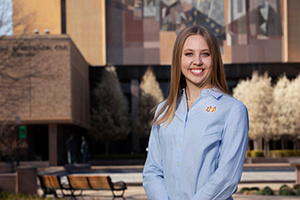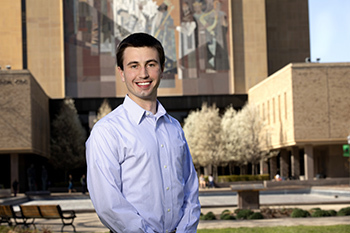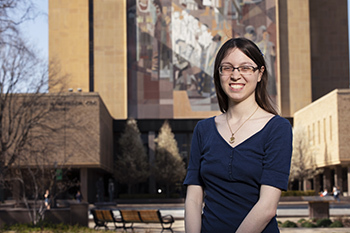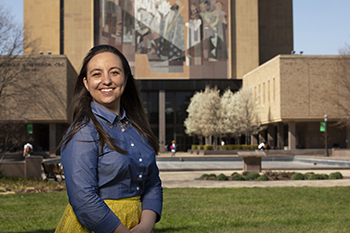Business major receives Undergraduate Library Research Award
Published: May 20, 2018 / Author: Jenna Mrozinske
On May 4 (Friday), five undergraduate students from the University of Notre Dame received an Undergraduate Library Research Award (ULRA).
This annual award is earned by students who demonstrate exemplary research skills and utilize a breadth of library services, resources and expertise for their research or creative projects.
Sponsored by the Hesburgh Libraries and the Flatley Center for Undergraduate Scholarly Engagement, with support from other campus entities, the ULRA provides students with a network of support and offers inspiration to those beginning original research or capstone projects.
“The Hesburgh Libraries are committed to enhancing the academic and research success of Notre Dame’s undergraduates and expanding faculty and staff expertise and library resources to advance undergraduate research and scholarship,” said Diane Walker, Edward H. Arnold University Librarian. “This year’s ULRA winners have built new skills and learned new tools that support not only academic success — but success throughout their postgraduate careers.”
Kaleigh Brauns, First Year of Studies, business analytics and applied and computational mathematics and statistics
 Kaleigh Brauns
Kaleigh Brauns
Freshman Kaleigh Brauns won first prize in the 10000 category for her paper, “Manufacturing Monopolies: Why Drug Manufacturers are at the Root of the Recent Rise in Pharmaceutical Prices,” where she explored the unethical nature of the prescription drug market. Brauns was advised by John Duffy, the O’Malley Director of the University Writing Program.
In her ULRA essay, Brauns reflected on the challenges of writing a research paper and the steps taken to narrow her topic. She consulted with First Year of Studies Librarian Melissa Harden, who introduced her to the vast array of online services provided by the library. She explored databases, utilized the Interlibrary Loan service and consulted with the Ask Us Desk.
Through a set of case studies, she discovered that manufacturers are at the root of the industry’s problems. Brauns said, “Without the help of the library and all of the resources they offer to students, I would not have been able to write such a cohesive and well-researched paper.”
Tim Seida, economics
 Tim Seida
Tim Seida
Tim Seida won first prize in the Senior and Honors Thesis category for his senior thesis, “What Does ‘Dr. Copper’ Say? An Analysis of Price Expectations in the Copper Market.” Advised by Christiane Baumeister, the Robert and Irene Bozzone Associate Professor of Economics, Seida analyzes the copper market price expectations that he says are an integral component for macroeconomic modeling and forecasting.
By leveraging various databases, software and digital library resources, Seida was able to critically evaluate the accuracy and consistency of data for his research. His data evaluation uncovered an issue with finding reliable spot price data, which he learned was a recurring problem in literature.
Seida utilized the Thomas Mahaffey Jr. Business Library where he consulted with subject librarian Pete Pietraszewski. He also earned his Bloomberg certification allowing him access to the financial data source. Seida said, “Mendoza’s library resources were essential to my project — not only for its data, articles and software, but also the excellent librarians, like Pete, who taught me how to be a researcher.”
Laura Neis, history
 Laura Neis
Laura Neis
Laura Neis received an honorable mention in the Senior and Honors Thesis category for her senior thesis, “Rare Women and True Martyrs: Female Martyrdom under Queen Elizabeth I.” With guidance from her adviser, Rory Rapple, associate professor of history and a fellow at the Nanovic Institute for European Studies, Neis explored the sexist application of treason laws toward Catholics under Queen Elizabeth I.
Due to the specificity of her topic, Neis had to seek specialized resources. Julie Tanaka, subject librarian in history, found her a rare manuscript located in the Westminster Diocesan Archives. Neis contacted the historian who was transcribing this manuscript, and he sent information critical to her argument that women were treated differently because of gender.
Neis utilized many library resources in her research. She consulted with subject librarians, used online resources and participated in a class offered by Rare Books and Special Collections. Neis said, “Without the Hesburgh Library’s resources, I would not have been able to write this thesis. I am incredibly grateful for the opportunities provided to me by this wonderful library.”
Gargi Purohit, economics
 Gargi Purohit
Gargi Purohit
Gargi Purohit, junior, won first prize in the 20000-40000 category for her paper, “Getting a Seat at the Table and Keeping it.” Purohit’s economics professor and adviser, Kirsten Cornelson, prompted the class to outline evidence for a policy that reduces inequality. Purohit’s research examines the expansion of affirmative action for women and racial minorities.
Purohit consulted with Leslie Morgan, Africana studies and education librarian. Morgan taught her how to effectively use the advanced search options when looking at peer-reviewed academic papers. She learned how to find databases and LibGuides that focus on her topic, which streamlined her research process.
These resources helped her compile recent statistics on student population and racial composition of select colleges, and statistics on women and people of color in science, technology, engineering and mathematics. “With Leslie Morgan’s guidance, I was able to not only acquire the skills to find papers for my topic, but also learn how to apply those skills to future projects,” said Purohit.
Nadezhda Braun, Russian
 Nadezhda Braun
Nadezhda Braun
Nadezhda Braun, senior, received an honorable mention in the 20000-40000 category for her paper, “Representation of the Female Experience of the Soviet Era in the Poetry of Elena Shvarts.” Braun was advised by Emily Ambrose Wang, assistant professor in German and Russian languages and literatures.
Braun’s research focused on the connection between the female experience and feminine expression of art, specifically in the poetry of Elena Shvarts. Braun chose Shvarts’ work because she published through the underground artistic community, offering an insight not censored by the Soviet government. She concluded that “Shvarts’ use of jarring contrast implicated her place in the forced duality of the female experience in the Soviet Union.”
Braun spent most of her time in the eighth and 11th floors of Hesburgh Library, home to the Russian history and literature collections. She utilized the renovated spaces which supported her research and writing process. In her ULRA essay, Braun recognized the “unsung heroes at Hesburgh Libraries who created an environment where I could create my best work.”
For more information on the Undergraduate Library Research Award visit library.nd.edu/ulra.
Contact: Tara O’Leary, Hesburgh Libraries, toleary2@nd.edu, 574-631-1856
Originally published by at news.nd.edu on May 17, 2018.




